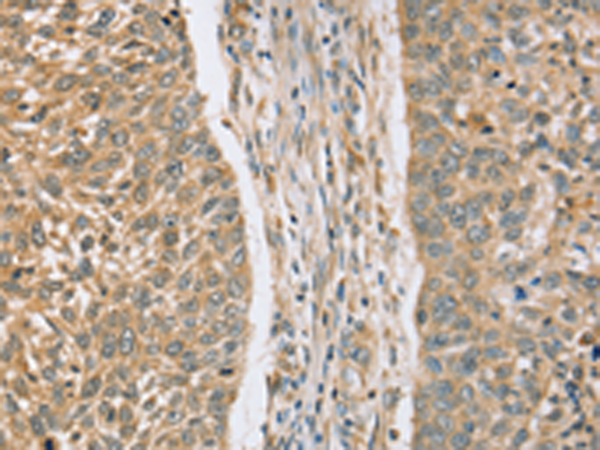
| WB | 咨询技术 | Human,Mouse,Rat |
| IF | 咨询技术 | Human,Mouse,Rat |
| IHC | 1/25-1/100 | Human,Mouse,Rat |
| ICC | 技术咨询 | Human,Mouse,Rat |
| FCM | 咨询技术 | Human,Mouse,Rat |
| Elisa | 1/2000-1/5000 | Human,Mouse,Rat |
| Aliases | AD037 |
| Host/Isotype | Rabbit IgG |
| Antibody Type | Primary antibody |
| Storage | Store at 4°C short term. Aliquot and store at -20°C long term. Avoid freeze/thaw cycles. |
| Species Reactivity | Human, Mouse, Rat |
| Immunogen | Fusion protein of human RASSF4 |
| Formulation | Purified antibody in PBS with 0.05% sodium azide and 50% glycerol. |
+ +
以下是与RASSF4抗体相关的3篇参考文献及其摘要概括:
1. **文献名称**:*"Development of a monoclonal antibody specific for RASSF4 and its application in detecting protein expression in colorectal cancer"*
**作者**:Li Y, et al.
**摘要**:该研究开发了一种针对RASSF4蛋白的单克隆抗体,并通过Western blot和免疫组化验证其特异性。研究发现RASSF4在结直肠癌组织中表达显著下调,提示其可能作为肿瘤抑制因子发挥作用。
2. **文献名称**:*"RASSF4 regulates cell proliferation and apoptosis through the Hippo signaling pathway via interaction with MST1"*
**作者**:Wang X, et al.
**摘要**:利用RASSF4抗体进行共免疫沉淀和免疫荧光实验,发现RASSF4通过与Hippo通路核心蛋白MST1相互作用调控细胞增殖与凋亡,抗体在机制研究中用于蛋白定位和相互作用验证。
3. **文献名称**:*"Epigenetic silencing of RASSF4 in gastric cancer and its clinical significance"*
**作者**:Zhang H, et al.
**摘要**:通过免疫组化(使用RASSF4特异性抗体)分析胃癌组织中RASSF4的表达,发现启动子甲基化导致其表达沉默,且低表达与患者预后不良相关,提示RASSF4可作为潜在生物标志物。
以上研究均涉及RASSF4抗体的开发或应用,涵盖癌症机制探索及临床相关性分析。
The RASSF4 antibody is a crucial tool for studying the Ras association domain family member 4 (RASSF4), a protein encoded by the *RASSF4* gene, which belongs to the RASSF tumor suppressor family. RASSF proteins are characterized by Ras association (RA) domains and play roles in apoptosis, cell cycle regulation, and microtubule stability. RASSF4. specifically, contains an RA domain and a SARAH (Sav/RASSF/Hpo) domain, enabling interactions with Hippo pathway components like MST1 kinase. It regulates cell proliferation, apoptosis, and cytoskeletal dynamics, with emerging links to tumor suppression. Dysregulation of RASSF4. often due to promoter methylation or genetic alterations, has been implicated in cancers, including breast, lung, and hepatocellular carcinoma.
RASSF4 antibodies are widely used in Western blotting, immunohistochemistry (IHC), and immunofluorescence (IF) to detect RASSF4 expression and localization in tissues or cell lines. These antibodies help elucidate its role in signaling pathways and disease mechanisms. Commercial RASSF4 antibodies are typically raised in rabbits or mice, targeting specific epitopes (e.g., N-terminal or C-terminal regions). Validation methods, such as knockout cell lines or siRNA knockdown, ensure specificity, as cross-reactivity with other RASSF family members (e.g., RASSF1. RASSF5) must be ruled out. Researchers prioritize antibodies with high affinity and reproducibility to study RASSF4’s tumor-suppressive functions, epigenetic silencing in cancer, and potential as a therapeutic target or biomarker.
×